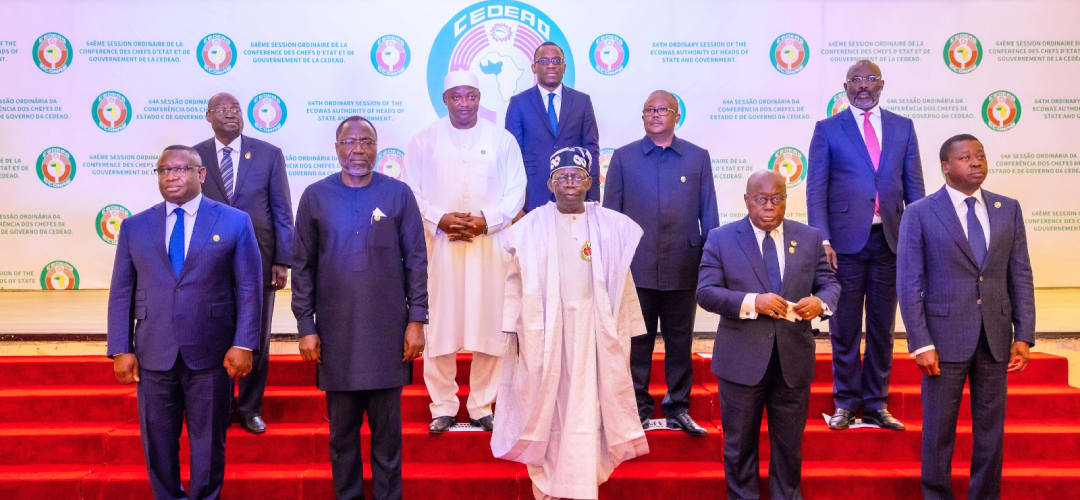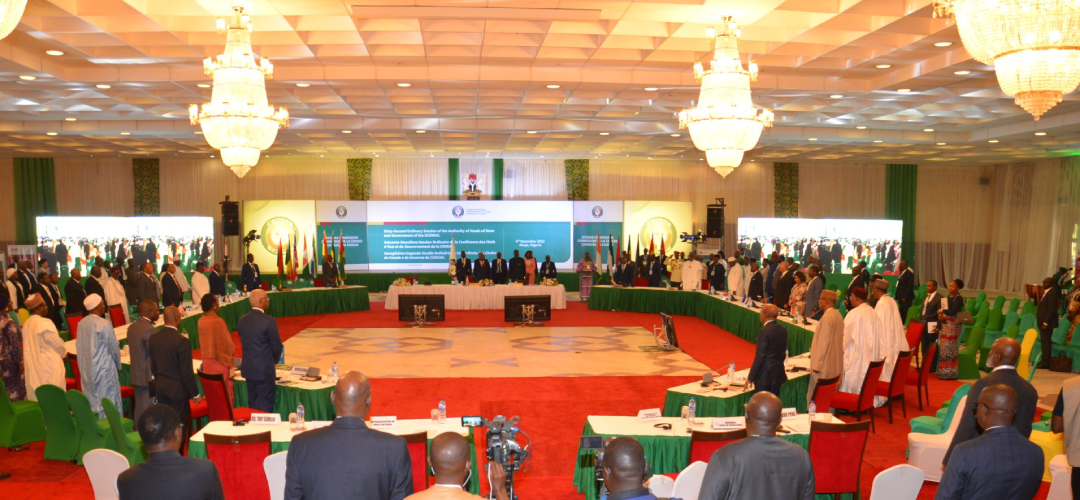A Precarious Dance
December 16, 2023 | Expert Insights

The Sahel in 2023 remained an arid mosaic of uncertainty, its fragile democracies precariously balanced on the edge of a political precipice. Since 2020, a series of military coups – in Mali, Burkina Faso, Guinea, and most recently, Niger –plunged the region into a state of deep disquiet.
After resorting unsuccessfully to military threats and economic sanctions to pressure the ruling military juntas into compliance, the Economic Community of West African States (ECOWAS) recently convened to chart a long-term strategy to secure the region's democratic and peaceful future.
Background
Niger's July coup, orchestrated by the National Council for the Salvation of the People (CNSP), had reverberated throughout the Sahel. President Mohamed Bazoum was known to be a forward-looking proponent of democratic principles and good governance, and his abrupt ousting cast a long shadow, not only over Niger but across the entire region, where hard-won democratic gains seemed increasingly vulnerable.
Sadly, this was not an isolated incident; it was part of a worrying trend fuelled by a complex cocktail of grievances against perceived government failures, deteriorating security situations, persistent poverty that had simmered for years and militaries that had never been under the full control of democratic institutions. The coups, born from this volatile mix, threaten to unravel the threads of progress and plunge the region back into the darkness of instability.
The ECOWAS summit tackled the Niger crisis head-on, recognising the urgency of both immediate action and a broader regional strategy. Engaging the CNSP was paramount, and a dedicated committee from Benin, Togo, and Sierra Leone was entrusted with this delicate task. Their mission: to navigate the treacherous terrain of dialogue and negotiate a roadmap for a swift transition back to civilian rule, paving the way for the lifting of crippling sanctions imposed by ECOWAS. But the crisis is not limited to Niger- Mali, Burkina Faso, and Guinea, each mired in their transitional struggles also demand attention.
Recognising the unique challenges each nation faces, the summit called for "realistic and short transition plans" tailored to their specific contexts. Lifting travel restrictions on key officials from these countries was seen as a way to foster dialogue and bridge the gap towards progress.

Analysis
The 2023 ECOWAS summit transcended the bounds of a regional gathering, becoming a stage where the world's concern for the Sahel's fate resonated loud and clear. The presence of international representatives, including a delegation from the United States, was more than a symbolic gesture; it was a powerful statement of global commitment to the region's stability. This international engagement bolstered ECOWAS's efforts in several crucial ways.
Firstly, it amplified the pressure on the CNSP and other regional actors to adhere to democratic principles and uphold the agreed-upon transition plans. The weight of international scrutiny added significant heft to ECOWAS's own sanctions and diplomatic pressure, making it harder for the CNSP to dismiss them as solely regional concerns.
Secondly, the summit showcased a united front against the tide of coups and instability threatening the Sahel. The willingness of diverse nations, from West Africa to the United States, to stand together sent a clear message that the region's future would not be decided solely by internal power struggles. This global solidarity strengthened ECOWAS's hand in negotiations and diplomacy, providing a sense of collective responsibility for the region's well-being.
Furthermore, the international presence signalled a recognition of the Sahel's strategic importance. The region not only faces its own internal challenges but also serves as a critical buffer against transnational threats like jihadism, human trafficking, and climate instability. Addressing these issues demands a coordinated global response, and the summit demonstrated the world's understanding of this interconnectedness.
However, glimmers of hope were shrouded in uncertainties. The CNSP's true commitment to dialogue and a swift transition still remains clouded in uncertainty, casting doubt on the success of the negotiated roadmap. The spectre of jihadist threats lurks in the shadows, exploiting the instability to further their agendas and destabilizing the region further. The nascent "Alliance of Sahel States" formed by Mali, Burkina Faso, and Niger raised concerns about potential fragmentation, a divergence from the democratic principles championed by ECOWAS, and a potential setback for regional unity.
While the immediate challenges of navigating political transitions and mitigating the fallout of coups demand urgent attention, the Sahel's path to stability hinges on addressing the deeply entrenched root causes of its instability. These issues, like a tangled web of thorns, have choked the region's progress, fuelled grievances and fostered fertile ground for the seeds of unrest to take root. At the heart of this web lies widespread poverty, a persistent scourge that traps millions in a cycle of vulnerability and despair. Lack of access to necessities, limited economic opportunities, and unequal distribution of resources create fertile ground for resentment and fuel disillusionment with governments perceived as failing to deliver necessities.
Youth unemployment exacerbates this vulnerability. Brimming with energy and aspirations, young people face a bleak future with limited prospects for decent jobs and a meaningful stake in society. This lack of opportunity breeds frustration and disillusionment, making them susceptible to the siren songs of radicalism or the allure of armed uprisings.
Furthermore, weak governance casts a long shadow over the Sahel. A lack of transparency, accountability, and effective institutions erodes trust in government and undermines the rule of law. This fosters a climate of impunity and creates fertile ground for corruption and mismanagement, further deepening the chasm between the governed and the governors. This requires robust legal frameworks and a cultural shift towards a more inclusive and participatory governance model.
Tackling these deeply ingrained issues requires a long-term, multi-pronged strategy. Investment in development is crucial, with a focus on improving education, healthcare, and infrastructure. Equipping the younger generation with skills and knowledge empowers them to become drivers of positive change and fosters a sense of ownership in their future.
Regional cooperation is another critical piece of the puzzle. The Sahel's challenges transcend national borders, and effective solutions require a collective approach. Sharing resources, expertise, and best practices can amplify the impact of individual efforts and create a more resilient regional ecosystem.
Assessment
- The Sahel's journey toward stability will be a long and arduous one, a complex dance requiring both unwavering resolve and a nuanced understanding of the region's evolving challenges.
- The 2023 ECOWAS summit, with its multifaceted approach and international backing, has taken a crucial step. The presence of international representatives was not merely a footnote; it was a vital thread woven into the tapestry of the region's future. It highlighted the global concern for the Sahel's stability, bolstered ECOWAS's efforts to navigate the turbulence, and signalled a collective commitment to a brighter future for the region.
- The next moves – by ECOWAS and the individual nations themselves – will ultimately determine whether hope triumphs over uncertainty in the Sahel. Addressing the root causes of instability, fostering inclusive dialogue, strengthening democratic institutions, and promoting regional cooperation are the critical steps towards securing a brighter future for the region. The Sahel's fate hangs in the balance, and the world watches with bated breath as ECOWAS navigates this precarious dance.








Comments